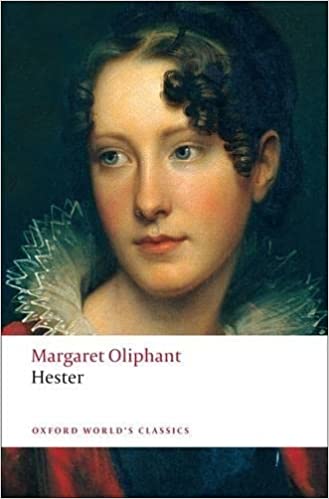When I was reading Hester, I reflected that it might more aptly be named Catherine. However, at the time it was written (published in 1883), many novels were named after their young and beautiful heroines. Catherine is neither young nor beautiful, but almost every action in this book refers back to her.
When Catherine Vernon was a young woman, she was engaged to marry John Vernon, her cousin and co-owner of Vernon’s, the family bank. The entire community is proud of Vernon’s, which is considered more trustworthy even than the Bank of England. John jilted Catherine to marry a gentle foolish woman, called Mrs. John in the novel. Later, John got the bank into financial difficulties and fled, presumably also embezzling some money. Although Catherine never had anything to do with the workings of the bank, she used her personal fortune to rescue it and took over its management.
Some years later, John Vernon has died, leaving his wife and daughter Hester destitute. Catherine has divided one of her properties into apartments and offered them to relatives who need them, so she kindly offers a home to Mrs. John and Hester. Hester, at fourteen, knows nothing about her father’s perfidy and is very proud. She notices that some of Catherine’s dependents are both sycophantic and ungrateful but also that their behavior amuses Catherine. Hester is offended by this and tends to misjudge Catherine. Since Hester is sulky and rude, Catherine misjudges her, and they proceed to misunderstand each other.
Catherine has brought two young cousins in to learn to run the bank, and by the time Hester is a young woman, they are in charge of it. Henry is a hard worker and is grateful to Catherine for the opportunity, but he is only moderately intelligent and depends on Edward for difficult decisions. Catherine has come to love Edward like a son and has given him a place to live in her own home. What she doesn’t know is that his apparent regard is false. He is bored at the bank and wants to be able to make his own fortune (presumably using the bank’s money to start it). He also misjudges Catherine and thinks she spies on him.
Hester grows into a beautiful independent woman who is used to being ignored and disregarded. However, she has an unusual relationship with Edward, who ignores her when Catherine is around because Catherine doesn’t like her but exchanges cryptic looks and comments with her.
The reader knows this behavior is ungentlemanly as is his two-faced behavior with Catherine, but while the steadfast Harry proposes to Hester and is refused, and she is briefly attracted to a young stockbroker, grandson to her neighbors, she eventually falls in love with Edward.
This is an insightful novel about complex human relationships. I really think Margaret Oliphant, especially with this novel, is right up there with George Eliot and Dickens. The Introduction to my edition calls Hester Oliphant’s masterpiece, and although I have read and enjoyed several of her books but not all (who could? she was unbelievably prolific), I so far agree.


Oh, I’m glad you think so highly of this one since it’s on my CC list! It’ll be my first Oliphant novel, although I think I may have read one or two short stories by her in various anthologies. It does sound interesting in terms of the women, Catherine at least, playing rather more of a role of the world than is often the case in books of that era.
I read her entire Carlingford series plus a couple others.
I started reading this some years ago. Unfortunately, I had a terrible reading copy so never finished it. Should try it again though.
It’s very good. I found a paperback.
I haven’t read anything by this author but I like the sound of this book. Thanks for the review – I enjoyed reading it.